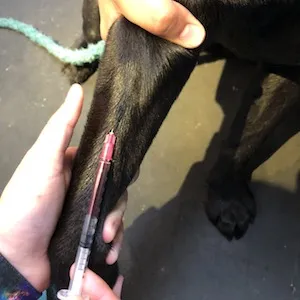Discovering worms in your dog’s poop can be a startling and unsettling experience for any pet owner, especially if your beloved companion is already on a regular heartworm prevention regimen. Many assume that consistent heartworm medicine equates to comprehensive parasite protection, making the sight of worms even more confusing and alarming. However, seeing worms in your dog’s feces after administering heartworm medication is often a sign that the treatment is working effectively, rather than an indication of failure. This phenomenon is usually tied to the dual-action nature of many heartworm preventives, which often include ingredients designed to tackle common intestinal parasites as well.
This article will delve into why you might encounter worms in your dog’s stool after giving heartworm medicine, distinguish between heartworms and the intestinal parasites you’re likely seeing, and guide you on what steps to take to ensure your dog’s continued health and effective parasite control. Understanding the different types of worms, how medications work, and the importance of veterinary consultation is key to maintaining your dog’s well-being.
Understanding Your Dog’s Worms: Heartworms vs. Intestinal Parasites
To comprehend why worms might appear in your dog’s poop after heartworm medication, it’s essential to differentiate between heartworms and other common internal parasites. These worms affect different parts of your dog’s body and are targeted by different types of medications.
Heartworms: The Internal Threat
Heartworm disease is a severe and potentially fatal condition caused by foot-long worms (Dirofilaria immitis) that reside in the heart, lungs, and associated blood vessels of affected pets. Dogs are natural hosts for heartworms, meaning the parasites can mature into adults, mate, and produce offspring within their bodies. Left untreated, heartworm numbers can multiply into the hundreds, leading to severe lung disease, heart failure, and damage to other vital organs.
It’s crucial to understand that heartworms are not typically expelled in your dog’s feces. They live internally within the cardiovascular system, and their presence is detected through blood tests, not by observing stool. The purpose of heartworm medicine is to prevent the maturation of microscopic larval heartworms transmitted by mosquitoes into adult worms, thereby preventing the disease from establishing itself.
Common Intestinal Worms: What You Might See
In contrast to heartworms, intestinal worms live in your dog’s gastrointestinal tract and are frequently passed in feces, especially after deworming treatment. These are the parasites you’re most likely seeing. Common types include:
- Roundworms (Ascarids): These are perhaps the most common worms found in dog poop. They look like spaghetti or thin noodles, typically white or light brown, and can be several inches long. Puppies are often born with roundworms, and adult dogs can contract them from contaminated soil or ingesting infected rodents.
- Hookworms: These small, thin worms are rarely seen in feces because they embed themselves in the intestinal lining to feed on blood. However, their eggs are passed in stool and diagnosed via a microscopic fecal exam. If seen, they are very tiny, thread-like. They cause anemia and can be transmitted through contaminated soil or from mother to pup.
- Whipworms: These worms have a distinctive “whip-like” appearance, with a thick anterior and a long, thin tail. They are typically 1-2 inches long and live in the large intestine. Like hookworms, they are often difficult to spot in stool, but their presence can cause chronic diarrhea, weight loss, and anemia.
- Tapeworms: These parasites are segmented and look like grains of rice or small, moving white segments (proglottids) clinging to your dog’s fur around the anus or in fresh feces. Dogs usually get tapeworms by ingesting fleas infected with tapeworm larvae or by eating raw meat or infected prey animals.
 Common intestinal worms found in dog feces
Common intestinal worms found in dog feces
Why You Might See Worms in Poop After Heartworm Medication
The primary reason you might see worms in your dog’s poop after giving heartworm medicine is often because the medication is doing more than just preventing heartworms.
Combination Preventives: Doing Double Duty
Many modern heartworm preventives are formulated as broad-spectrum parasite control, meaning they contain active ingredients that target not only heartworm larvae but also several species of common intestinal worms. This multi-action approach provides comprehensive protection against various internal parasites that can affect your dog’s health.
For instance, a single monthly chewable might prevent heartworm disease while simultaneously treating and controlling roundworms, hookworms, and sometimes whipworms. Some comprehensive products even offer protection against fleas and ticks, essentially providing a 2-in-1 flea and worm treatment for dogs that simplifies parasite management for pet owners. If your dog’s heartworm medication includes such an intestinal dewormer, seeing worms in their stool is a direct result of this additional action.
The Medication is Working: Expelling Dead or Dying Worms
When an effective dewormer is administered, it paralyzes or kills the intestinal worms present in your dog’s digestive tract. Once affected, these worms are expelled from the body through defecation. Therefore, seeing dead or dying worms (which may still be wiggling as they pass) in your dog’s poop after heartworm medication is often a positive sign that the deworming component of the medicine is successfully clearing out an existing intestinal worm burden.
The timeframe for seeing worms can vary, but generally, you might observe them anywhere from a few hours to a few days after administering the medication. This expulsion is a natural part of the deworming process.
Persistent or New Infections
While seeing worms can indicate the medication is working, there are also scenarios where it might signal an ongoing issue:
- Not All Worms Covered: Not all heartworm preventives cover all types of intestinal worms. For example, some may not include an ingredient effective against tapeworms, especially those transmitted by fleas. If you’re seeing tapeworm segments, it might mean your dog needs a specific tapeworm dewormer.
- Heavy Infestations: In cases of very heavy intestinal worm infestations, a single dose of a preventative might not eliminate all worms, or it might take longer for the body to expel them entirely. Follow-up treatment might be necessary.
- Re-infection: Dogs can easily pick up intestinal worms from their environment, especially if they spend time outdoors, eat contaminated soil or feces, or hunt small prey. Re-infection can occur even if they were dewormed recently.
- Incorrect Dosage or Administration: If the medication was not given correctly (e.g., spit out, vomited, or an incorrect dosage based on weight), it might not have been fully effective.
- Heartworm Medicine’s Primary Focus: Remember that while many heartworm preventives have secondary deworming benefits, their primary role is to prevent heartworm disease by killing immature heartworm larvae. They are not primarily designed to eradicate heavy adult intestinal worm burdens in the same way a targeted dewormer might.
What to Do When You Discover Worms in Your Dog’s Feces
Finding worms in your dog’s stool can be alarming, but acting promptly and consulting your veterinarian is the best course of action.
Don’t Panic – But Act Promptly
While it’s natural to be concerned, seeing worms after heartworm medicine often means the medication is effectively doing its job against intestinal parasites. However, it’s always best to confirm this with a professional.
Collect a Sample and Contact Your Veterinarian
- Collect a Sample: Carefully collect a fresh stool sample (within 12-24 hours) that contains the worms. Use a clean container or a sealed plastic bag. This sample will be crucial for your vet to identify the type of worms present.
- Contact Your Veterinarian: Call your vet’s office immediately. Describe what you’ve seen, including the appearance of the worms, when you last gave heartworm medication, and the specific product name. Your vet will advise you on bringing in the stool sample for analysis.
Follow-Up Testing and Treatment
Your veterinarian will likely perform a fecal examination (fecal floatation) on the collected sample. This test identifies worm eggs and sometimes adult worms, allowing them to accurately diagnose the specific type of intestinal parasite. Based on the diagnosis, your vet may:
- Confirm that the worms you saw were indeed intestinal worms targeted by your dog’s heartworm preventive, indicating it worked.
- Prescribe an additional, targeted dewormer if a different type of worm is identified (e.g., tapeworms not covered by the preventive) or if the infestation is particularly heavy.
- Advise on follow-up fecal exams to ensure complete eradication of the parasites.
 Veterinarian examining a dog's blood sample
Veterinarian examining a dog's blood sample
Comprehensive Parasite Prevention: Beyond Heartworms
Effective parasite control for your dog extends beyond just heartworm prevention. A holistic approach is essential to protect your pet from a wide range of internal and external parasites.
The “Think 12” Principle for Heartworm Prevention
The American Heartworm Society (AHS) strongly advocates for the “Think 12” principle:
- Test your pet every 12 months for heartworm. Annual testing is crucial, even for dogs on year-round prevention, to catch any potential infections early. Heartworm preventives are highly effective but not 100%, and missed or late doses can leave your dog vulnerable.
- Give your pet heartworm preventive 12 months a year. Heartworm disease has been diagnosed in all 50 states, and risk factors can be unpredictable due to climate variations, mosquito populations, and wildlife carriers. Year-round prevention offers the safest and most consistent protection. Even in colder climates, mosquitoes can survive indoors or travel long distances, making continuous prevention vital.
 Dog resting in a cage after treatment
Dog resting in a cage after treatment
Regular Fecal Examinations and Targeted Deworming
Even with broad-spectrum heartworm preventives, regular fecal examinations, typically annually or semi-annually, are recommended. These tests help vets identify any intestinal parasites that might not be covered by your regular preventive or indicate a re-infection. If worms are detected, your veterinarian can prescribe specific deworming treatments. Puppies, in particular, require more frequent deworming schedules due to their high susceptibility to intestinal worms transmitted by their mothers.
Environmental Hygiene and Management
Preventing exposure to parasites is a critical component of control:
- Promptly pick up dog feces: This reduces environmental contamination and the risk of re-infection for your dog and other pets.
- Control fleas: Since fleas transmit tapeworms, effective flea control is essential to prevent tapeworm infections. Many heartworm/intestinal worm preventives also include flea control.
- Prevent scavenging: Discourage your dog from eating wild animals (like rodents or rabbits) or raw meat, as these can be sources of various worms.
- Clean living areas: Regularly clean and disinfect your dog’s living spaces, especially if there has been a known parasite issue.
Understanding Heartworm Disease: A Quick Recap
While the focus of this article is on worms in poop after heartworm medicine, it’s vital to retain a clear understanding of heartworm disease itself, as it underscores the importance of the prevention you’re already providing.
What is Heartworm Disease?
Heartworm disease is caused by parasitic worms that live in the heart and lungs, leading to severe illness. It’s transmitted by mosquitoes carrying infective larvae.
Transmission and Risk Factors
Mosquitoes are the sole vector for heartworm transmission. When an infected mosquito bites a dog, it deposits infective larvae. These larvae then migrate through the dog’s body, eventually reaching the heart and lungs to mature. The disease has been diagnosed in all 50 states, and factors like climate, mosquito species, and the presence of wildlife carriers (coyotes, foxes) contribute to its prevalence.
Signs of Heartworm Disease in Dogs
In early stages, dogs may show no symptoms. As the disease progresses, signs can include:
- A mild, persistent cough
- Reluctance to exercise
- Fatigue after moderate activity
- Decreased appetite
- Weight loss
In severe cases, heart failure or caval syndrome (a life-threatening blockage of blood flow) can occur, leading to labored breathing, pale gums, and dark urine.
The Importance of Annual Heartworm Testing
Annual heartworm testing is non-negotiable, even if your dog is on year-round prevention. This simple blood test detects heartworm proteins, confirming whether your dog has become infected. Early detection significantly improves the chances of successful treatment. Puppies should be tested starting at 6 months of age, and adult dogs annually. If you’ve missed doses, immediate retesting and a follow-up test 6 months later are crucial.
If Your Dog Tests Positive for Heartworms
If a dog tests positive, the diagnosis is typically confirmed with a second, different test due to the complexity and cost of treatment. Treatment involves stabilizing the dog’s condition, restricting exercise, and administering melarsomine (an arsenic-based drug) to kill adult heartworms. This process is distinct from deworming for intestinal worms and requires strict veterinary supervision and post-treatment monitoring. After successful treatment, year-round heartworm prevention is essential to prevent re-infection.
 Veterinarian consulting with a dog owner
Veterinarian consulting with a dog owner
Conclusion
Finding worms in your dog’s poop after administering heartworm medicine can be a stressful moment, but it’s often an indication that the deworming agents within the medication are effectively clearing intestinal parasites. Many heartworm preventives offer broad-spectrum protection, targeting common worms like roundworms, hookworms, and whipworms in addition to preventing heartworm disease.
However, it’s crucial to differentiate between the serious threat of heartworms, which reside in the cardiovascular system and are not passed in feces, and intestinal worms, which are the ones you typically see. Whenever you observe worms in your dog’s stool, the most responsible action is to contact your veterinarian immediately. They can identify the specific type of worm through a fecal exam, confirm the effectiveness of your current parasite control, and recommend any additional, targeted treatments if necessary.
Maintaining your dog’s health requires a proactive and comprehensive parasite control strategy, including year-round heartworm prevention, regular fecal examinations, appropriate deworming for intestinal parasites, and strict environmental hygiene. By working closely with your veterinarian, you can ensure your dog receives the best possible protection against all types of parasitic threats, keeping them healthy and happy.
References
- American Heartworm Society. (n.d.). Heartworms in Dogs. Retrieved from https://www.heartwormsociety.org/heartworms-in-dogs
- U.S. Food and Drug Administration (FDA). (n.d.). Heartworm Prevention and Treatment. Retrieved from https://www.fda.gov/animal-veterinary/animal-health-literacy/heartworm-prevention-and-treatment
- Companion Animal Parasite Council (CAPC). (n.d.). Parasite Control Recommendations. Retrieved from https://capcvet.org/guidelines/ (Note: While not explicitly cited in the original text, CAPC is a highly relevant and authoritative source for this topic, aligning with EEAT principles)
